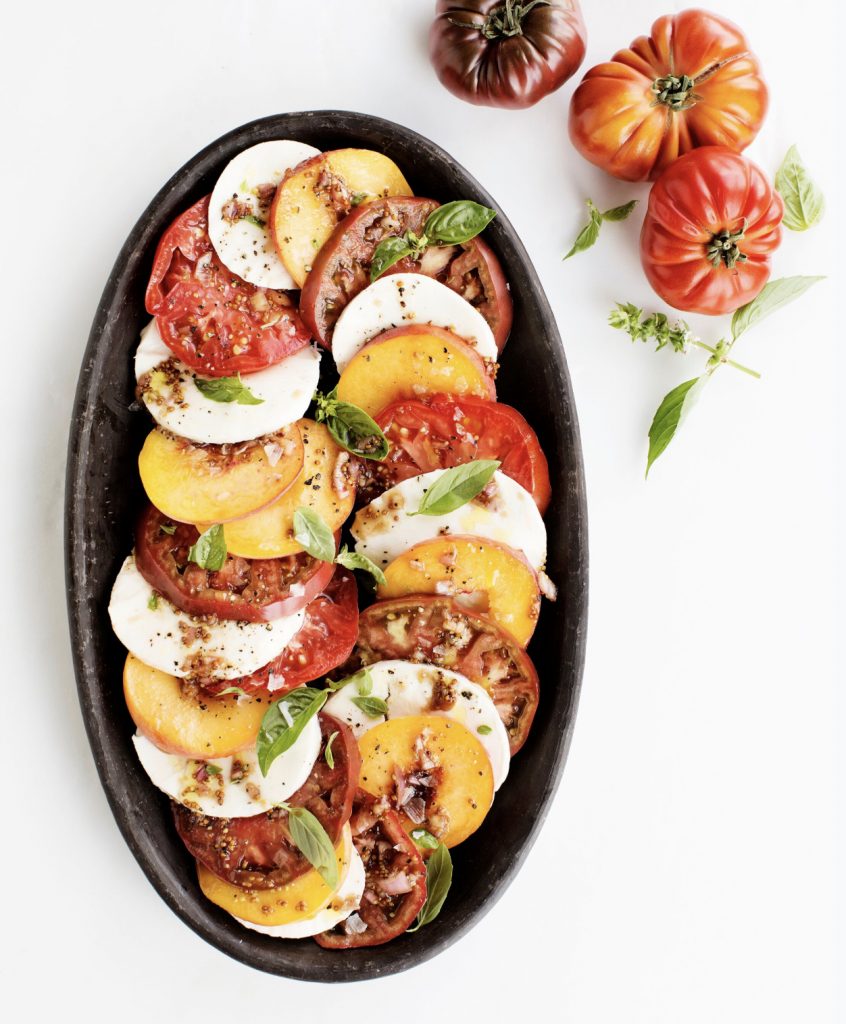
On one of the last rainy, cold spring days, I pull up to the ONEC1TY complex on Charlotte Avenue and note how all the grey shipping container buildings look like they’re in hibernation mode. But the new addition to their block is a pale pink container with string lights glowing around the outside and some cheery modern deck furniture defying the grey weather. This is the flagship “Skoop Shop” for Kokos, Nashville’s newest dairy-free and plant-based ice cream company. Two years in the making, the shop is perfectly nestled amongst similarly health-conscious neighbors like Avo, SandBar, Full Ride Cycling, and CrossFit—as if they’d all planned for decades to be here.
Inside I’m greeted by cofounders Jerusa van Lith and Sam Brooker, and the most elegant, grammable décor I’ve ever seen in an ice cream shop or shipping-container-turned-retail-space: emerald-green velvet chairs and stools, tiny gold side tables, happy plants, warm lighting, and walls painted in wide stripes of pale ice cream colors. In short, a place where you want to hang out to see and be seen.
Van Lith, Brooker, and I walk over to the ONEC1TY building to talk in a quiet corner of the lobby, and they take turns telling me more about the scene they’ve intentionally set at the shop and with their plant-based ice cream.
“Anything anywhere we can have a positive vibration or good effect with anything we do, we do that. We choose that over almost anything really,” Van Lith shares.
“[When you make] music, you hope people feel something. That’s the goal, right? Is that you create something that [makes] people feel something,” Brooker says. “That’s what ties into Kokos, too, is like you walk in and we want you to feel something, feel like the world’s a little bit more beautiful.”
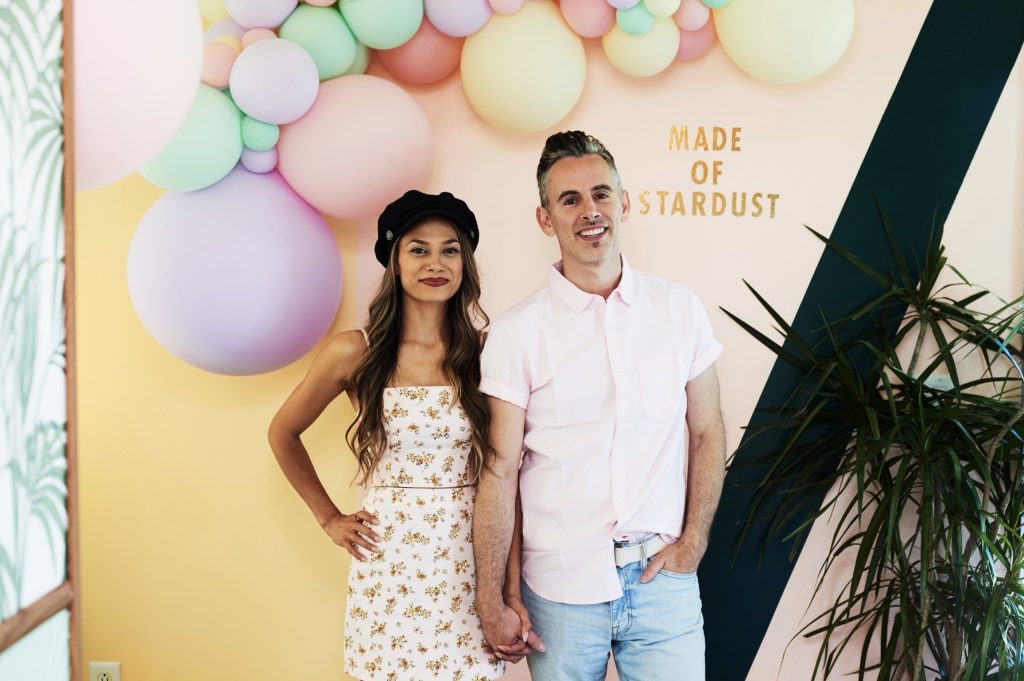
Before Brooker and Van Lith were making the world a bit more beautiful with ice cream, they were doing it through music. They had each traveled back and forth to Nashville for years for development deals as artists—Van Lith coming from Amsterdam and Brooker coming from Green Bay, Wisconsin. Then one night at a show, they intersected.
“I saw Jerusa and she’s standing with all my friends, and I was like, ‘I know all of you, but I don’t know you,’” Brooker says, pointing at his partner. They laugh and Van Lith’s eyes grow wide. “We found out that for five years that I was here, we had been circling in these same circles of people but never met,” she says.
“And then in typical Nashville style,” says Brooker, “our first hang was we wrote a song.”
The natural next step was to begin making music together and supporting each other’s projects. Brooker was starting a music publishing company with a friend, and Van Lith was writing and recording her first EP. But even with their success in music, both felt the need to keep pushing to the next challenge, the next expression. So, how did ice cream—and planted-based ice cream at that—become the medium for that expression?
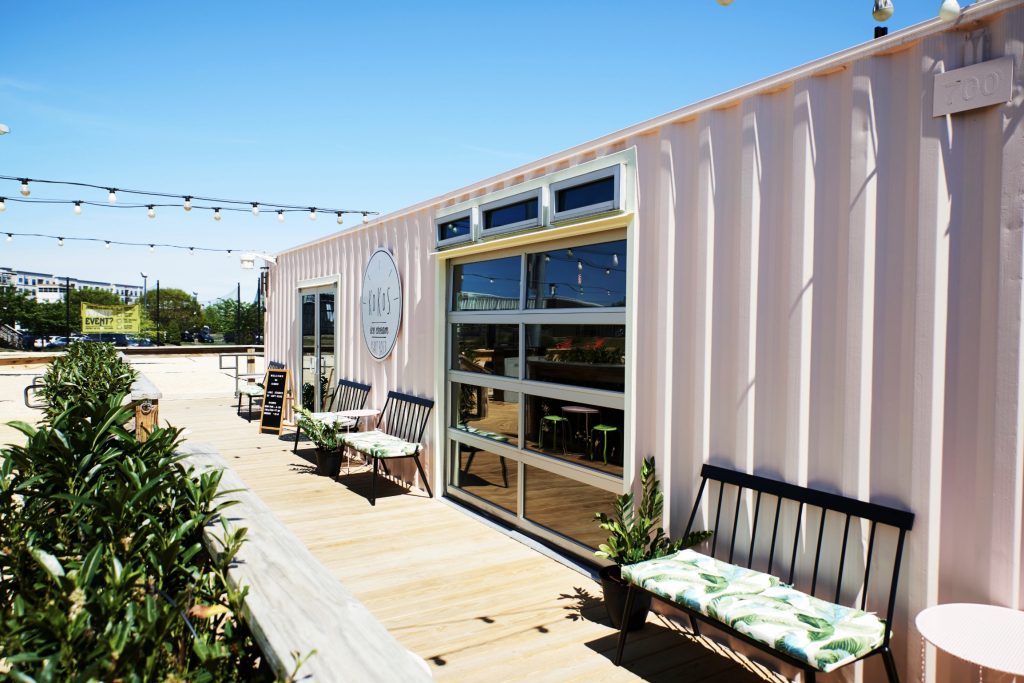
When I ask Brooker and Van Lith about this, they volley back and forth to explain.
“How do you explain that? It was just a conversation that happened,” Van Lith says.
“One thing is I can’t eat dairy,” says Brooker. “That was the first . . . why the conversation even came up, I guess . . . that turned into this concept of creating vegan ice cream, plant-based ice cream.”
“What we’re trying to say is, it could have been something else, but it isn’t something else because of all of our—how do you say that, like our independent lives and the life steps,” Van Lith explains.
Before Brooker came back to Nashville to stay, he had toyed with the idea of starting a chocolate shop in Wisconsin, where he grew up. But that was his only almost-foray into food. Van Lith, on the other hand, is no stranger to the service industry—or vegan cuisine. Her brother is a chef, her sister-in-law owns two vegan restaurants, and Amsterdam, like most European metropolises, is leagues ahead of the States when it comes to plant-based food.
Brooker had caught the entrepreneurial bug with the publishing company (where he signed the writer who penned Florida Georgia Line’s “Cruise”), and both he and Van Lith had learned self-marketing through being artists. Throw in two good palates and a passion for pushing boundaries, and Kokos was born.
True artists, Van Lith and Brooker sought to challenge people’s beliefs about ice cream and what it means to treat yourself. Van Lith says, “It’s ice cream so you’re thinking, well, how much can you challenge people with that? It’s actually, for some people—it can rub them the wrong way because you’re taking something that is so ingrained in culture, in American culture as well, and something you enjoyed throughout your childhood with your parents, with your grandparents, with your siblings . . . Then, if someone comes along and says, ‘Hey, actually, we made it better,’ does that mean that what you’ve enjoyed wasn’t good? You know what I mean? Unconsciously, that might be a trigger for people to have their walls up.”
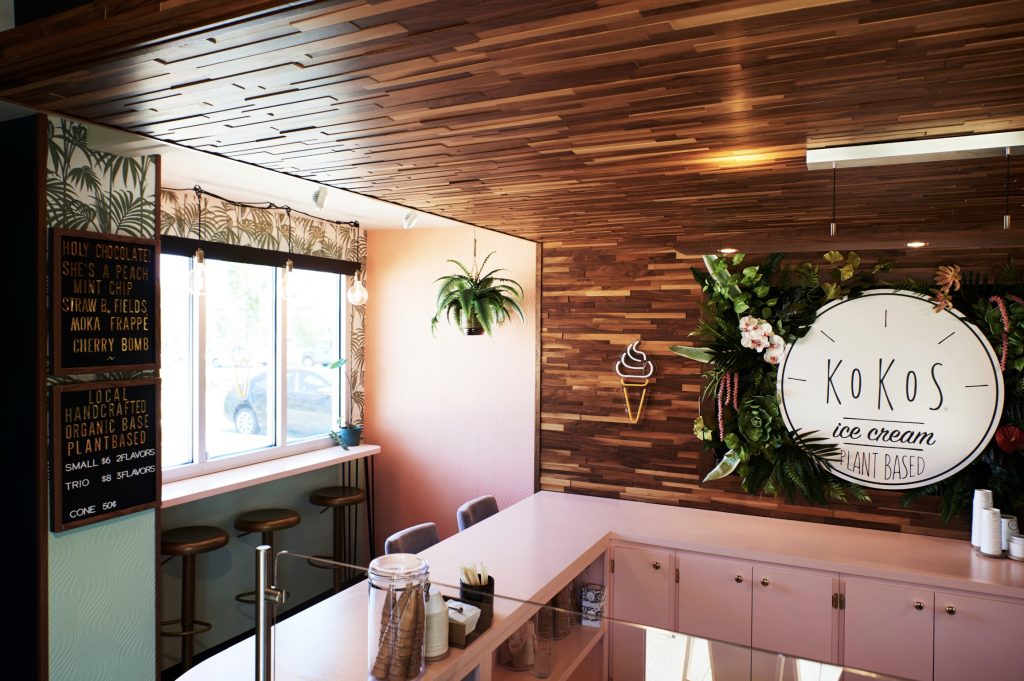
Brooker chimes in. “But it’s interesting, people’s preconceived notion. First of all, dairy-free can be really bad. We agree with that. We’re saying, ‘Yeah, it’s horrible.’ That’s why we created Kokos, to make it better. We say it’s better than ice cream.
“We’ve had so many people that at first get fooled. They don’t know, they eat it, and then they’re like, ‘Oh, I was expecting to have a stomachache after. Wait, this is plant based? Wow.’ Yeah, so that’s fun.”
But Kokos isn’t about getting on a dietary high horse and looking down on dairy-eaters. Instead, Brooker and Van Lith wanted to make something that was healthier yet generally delicious—for vegans and non vegans alike. The plant-based recipe was always central; they never thought of making it just an option on a traditional ice cream menu.
“It was never even a thought. It was let’s make the best ice cream we can, with the best ingredients. In turn, it just happens that our plant-based ice cream is as good if not better than using dairy, so why would we even think about it?” Brooker says.
For Kokos, the “best ingredients” include a 100 percent organic coconut milk base, organic and local ingredients where possible, and no nuts, so as to be allergy-friendly.
“We just wanted to make a happy, happy thing,” Van Lith says. “Really, it’s a happy experience, happy product, happy people. It’s just something light.”
They also took this idea into the shop space. Brooker points out that most ice cream shops don’t have mirrors on the walls, because you’re indulging in a guilty pleasure. Who wants to look at themselves when they’re feeling guilty? But Kokos has five mirrors in the Skoop Shop, which serve to not only brighten up the space but also remind customers that they can feel good about seeing themselves, about making a good choice. “You don’t have to hide anything. You can feel proud of yourself,” Van Lith beams. “Sure, there’s still sugar in there, but it’s not as much as regular ice cream, and it’s not a guilty pleasure. It’s just a happy pleasure.” (The rest of the inviting décor also comes from her creative mind—as Brooker jokes, “I didn’t see that much pink in my mind.”)
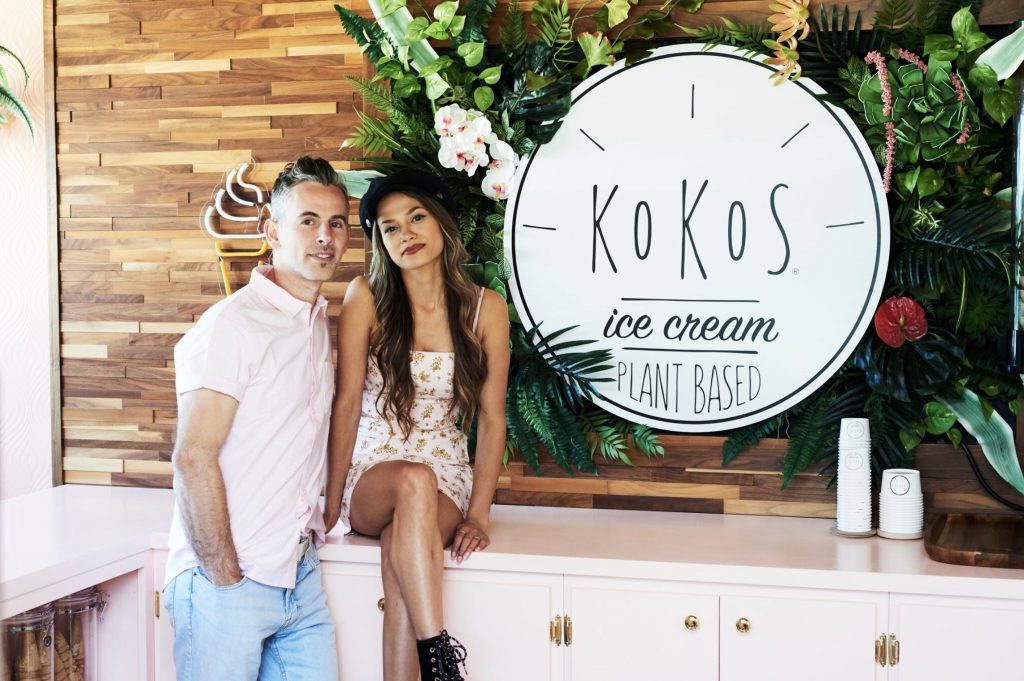
So far it sounds like Nashville likes that idea, because the grand opening of the Skoop Shop on April 11 was a hit: people lined up around the building before listening to The Band Pacific live on the deck or grabbing a taco from the Succulent Vegan Tacos truck. The space has been buzzing ever since, even on cold and rainy days. Their Kokos bicycle cart and Eastside to-go shop have been all the rage the past two years, but Van Lith and Brooker still seem humbled and surprised by the response to the shop.
And that saying “positive energy begets positive energy” applies here. Van Lith and Brooker’s dream is to take the Kokos brand global with pints in grocery stores and more Skoop Shop locations, and already local retailers like Graze, The Soda Parlor, Vege-licious Cafe, Herban Market, and the Vanderbilt campus market are spreading the Kokos plant-based gospel. They’re also currently building out a space in the Columbia arts district for their first Skoop Shop outside of Nashville. And they’ve got plans for a night market and festival that will feature local makers and musicians. They can’t not keep the creative spark going. “We wanna be a part of the growth, a part of the change, and keep adding more beauty into the city,” Brooker says.
All this, and they’re still making music as a duo called A Man and A Woman and traveling to Denmark to write with Danish friends (and Brooker is working on a music tech project). Is this a testament to this ice cream making you feel light and energetic? If so, I’ll take all the scoops, please.
Even with this in mind, I’m cautiously optimistic about trying Kokos for the first time. Like Brooker, my family is midwestern, so I basically have dairy running in my veins. Try as I might, I can’t quit cheese or ice cream, even when eating some Ben & Jerry’s after dinner means I will feel it burning through my system the rest of the night. I also love coconut milk but know from using it that it can be a finicky ingredient, sometimes “splitting” or becoming chalky.
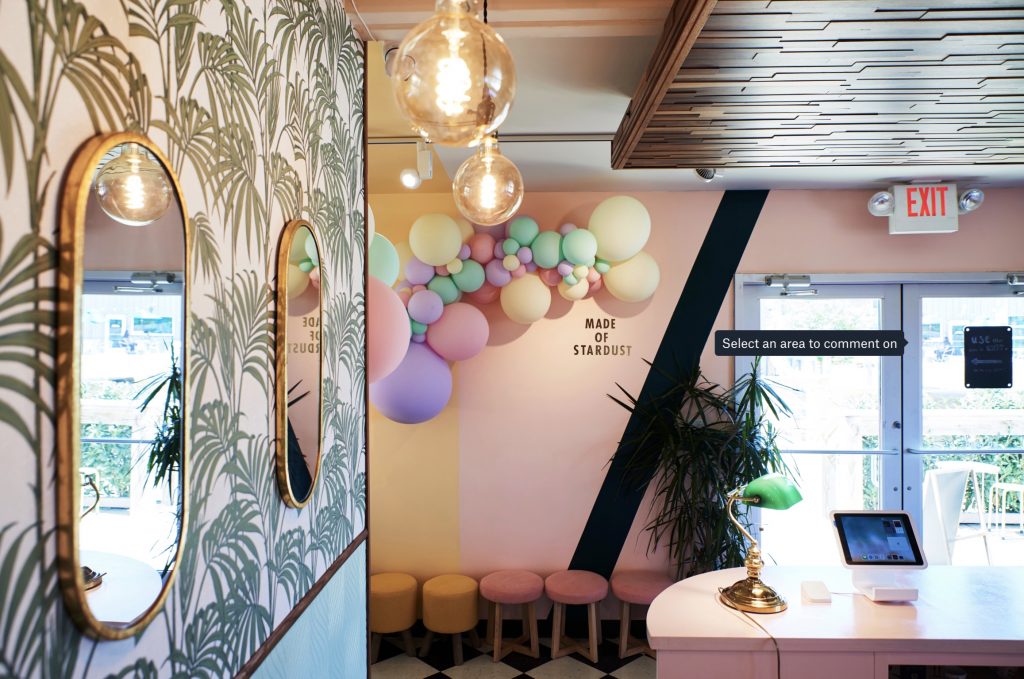
We brave the rain to head back to the shop, where I try samples of all the day’s flavors: Holy Chocolate, The Jam, Cherry Bomb, Matcha Mint, Moka Frappé, and Lemon Pie. The first thing I pay attention to is the texture, which Van Lith and Brooker say is a mix between American hard ice cream and European gelato. It’s a spot-on description, as this is possibly the creamiest ice cream I’ve ever had. Luxurious but light. Next I focus on the flavors, which the duo come up with based on their own tastes. They stick to six flavors, with a few regulars and a couple of seasonals in the mix. The Holy Chocolate gets the ravest reviews, and I immediately see why. The chocolate flavor, credited to high-quality chocolate (Brooker was almost in the biz), demands a moment of silence. Cherry Bomb is up there for me because I love cherries and it has a hint of coconut flavor (most of the other flavors do not, so coconut haters, don’t hate). I’m usually not a fan of matcha, but they add just enough to ground the delicate mint, and I would eat a whole bowl of it. The Moka is the punchy coffee flavor you want when you’re feeling up for a fight; The Jam is the vanilla with berry jam that takes you back to eating ice cream with your gram on the front porch swing. And all of these are dairy-free, vegan, gluten-free, and nut-free. Last but not least, if you can do gluten, the Lemon Pie is zingy, true-lemon flavor ice cream with a crunchy graham crust mixed in. It’s everything I want it to be. I want to live at Kokos now.
Given the choice, I would choose Kokos over regular ice cream—the flavors are balanced, it’s not greasy, it’s creamy to the max with no stodgy aftertaste, and I feel light and happy afterward instead of achy and gross. The only downside is this means I could just keep eating it, and since it does contain the aforementioned coconut milk and evaporated cane sugar, I would probably gain some happy pounds. But dang, my skin would look good from those healthy fats.
Thankfully, for now, the pair send me home with just two Kokos Kubes, which are their adorable pints packaged in an eco-conscious, origami-looking box complete with the Kokos signature palm leaf design on the outside. Now to keep my ice-cream pounding husband from them. I do share with him later, and for all his skepticism about anything nontraditional, he admits he wouldn’t have known it was anything other than real ice cream, and really good ice cream at that. Another convert.
If Van Lith and Brooker keep going at their current pace, it won’t be long before eating Kokos on the reg will be a convenient possibility for all of us. Until then, it’s definitely worth scooting over to ONEC1TY for a cone or a cup, a healthy dose of pink, and treating yourself better.
Kokos Skoop Shop is open Monday through Thursday 6 p.m. to 10 p.m., Friday and Saturday from 12 p.m. to 10 p.m., and Sunday from 12 p.m. to 8 p.m.
Suggested Content
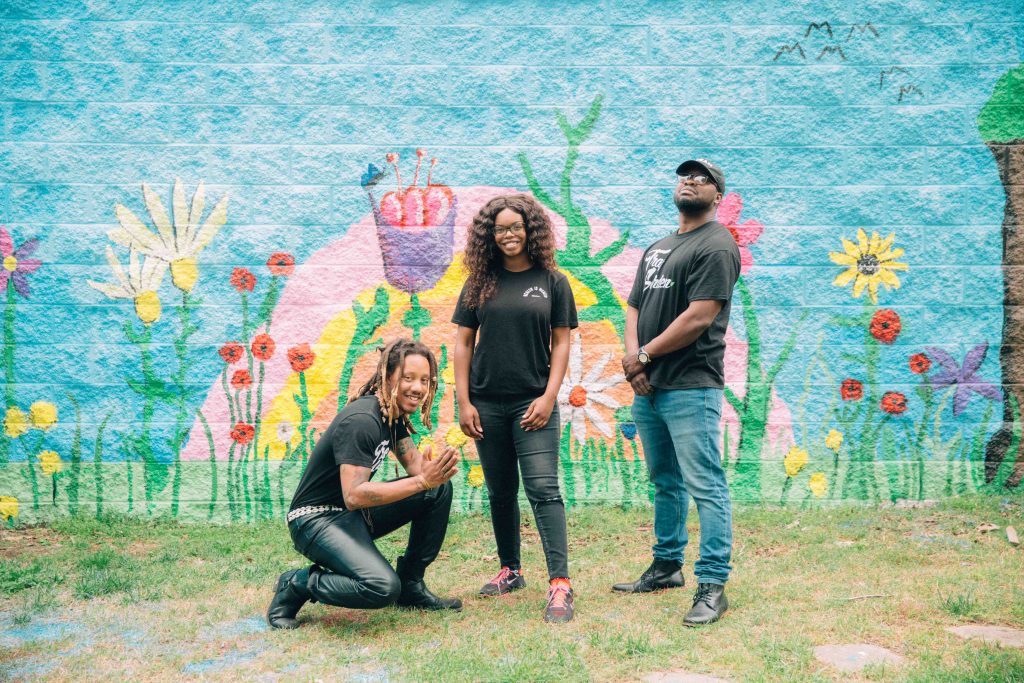
Can You Dig It?
How urban farming nonprofit Trap Garden is working to eradicate Nashville’s food deserts

